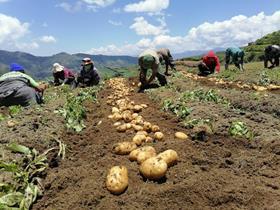
A project run by Universal Robina Corp (URC) and the Philippine government has provided a valuable boost to the country’s potato growers during the Covid-19 pandemic.
In 2018 URC partnered with the government to launch the Sustainable Potato Programme to provide growers with quality potato seed, training and research.
Since then URC has proved imported Granolapotato seeds from Canada to farming communities in Benguet, Mt Province, Bukidnon and Davao del Sur. The Programme has helped growers increase their yield fivefold, bolstering the industry through the disruptions of the Covid-19 pandemic.
Last year, the company was able to donate up to of 135 tonnes potato seeds imported from Canada to over 1,000 farmers.
“These were really quality seeds, and have been a big help for us,” said Ardan Copas, head of the United Potato Cooperative in Benguet.
“Despite the pandemic, we were able to produce a million kilos, thanks to this programme.”
Cooperatives participating in the programme have also received quality training, as well as access to the latest research and technology on potato farming.
In 2019, a group of farmers went on a five-day course in Canada as part of URC’s collaboration with the Prince Edwards Island Potato Board.
There, they learned new techniques on seeding and planting, soil management, storage and other key practices.
Laurent Levan, URC’s senior vice president for corporate development and external affairs said the initiative had been a win for all involved.
“Farmers get the resources they need to weather the pandemic. There is a boost in efforts to promote high-value crops like potato. URC, meanwhile, realises its goals under its people- and planet-friendly strategy,” said Levan.
“Our company is building its sustainability roadmap alongside the United Nations Sustainable Development Goals. This includes responsible sourcing, production, consumption and developing the capabilities of communities for better livelihood.”



